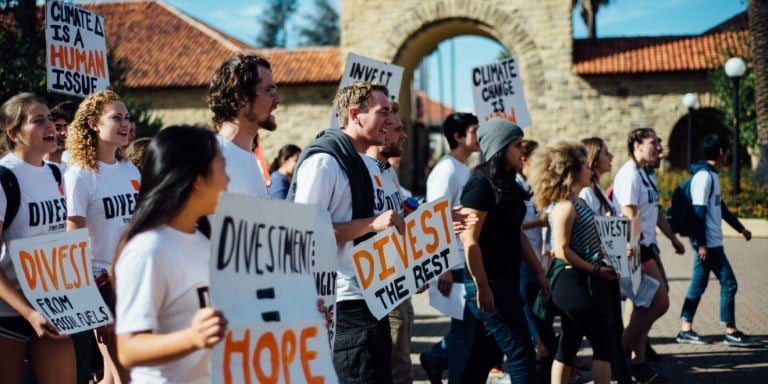In its latest initiative against Stanford’s investment in fossil fuels, Fossil Free Stanford (FFS) is calling on the Board of Trustees to take their money out of fossil fuels — or risk losing the Class of 2016’s Senior Gift.
At the heart of the new campaign is a new pledge for seniors to withhold their Senior Gift, as well as any future donations to the university, until Stanford divests. Officially a fundraising initiative for The Stanford Fund, the Senior Gift is also tradition — a way for the graduating class to “celebrate all that Stanford has meant to them.”
For the Fossil Free Stanford committee, it is an eloquent strike at where Stanford is putting its money.
“I would love to give my money to a university that has divested from fossil fuels, that has values aligned with what 75 percent of the student body believes in,” said Sophie Harrison ‘16, FFS board member and leader of the Senior Gift initiative. “At Stanford, I learned about active student citizenship — beautiful, beautiful words, but these values are not supported by the Board of Trustees.”
As of Tuesday, the university was not yet aware of the pledge and was unable to comment. Harrison says that FFS’s main negotiating partner has not been the Board of Trustees themselves, but the Advisory Panel on Investment Responsibility and Licensing (APIRL), which makes recommendations to the Board.
“To be honest, it’s really hard to talk to the Board of Trustees,” Harrison said. “Most of them only come for Board meetings. We’ve talked to APIRL, who then talks to the Board, but it’s hard to know if they’re listening.”
She added that FFS has been in talks with APIRL, who will raise the issue at the next Board meeting.
Meanwhile, FFS is keen to ensure that its core values get a strong showing on campus. At the time of writing, 142 people had signed the pledge, including a group of 50, mostly FFS-linked signers — including non-seniors.
“It’s not so much about the financial aspect of the senior pledge but about symbolism,” Hanna Payne ‘19 said of her decision to sign the pledge. “It’s about showing that we’re not supportive of a university that doesn’t live up to its values.”
If FFS is making a symbolic gesture, Charles D. Kolstad, professor, by courtesy, of economics, thought Stanford’s divestment would also be a symbolic effort at best.
“Certainly one university’s divesting will not change global emissions perceptibly,” Kolstad wrote in an email to The Daily. “Perhaps there is a bandwagon effect? Probably not.”
At the same time, Kolstad noted the significance of the campus divestment movement.
“From a logical point of view, divestment could be motivated by either moral objection to using fossil fuels or a notion that fossil fuels are a bad investment, because mitigation regulations will be coming,” Kolstad wrote. “Either is a legitimate reason to support divestment.”
Andrea Martinez ‘16, one of the first 50 to sign the pledge, explained her decision simply.
“Signing the pledge — as well as divestment — is a moral question for me,” Martinez said.
As an Earth Systems major who sat in on the COP 21 Climate Change Conference in Paris last year, Martinez believes that environmental issues are ultimately human issues.
“At the conference, I saw the indigenous community and what they were saying — it gets two degrees warmer faster where they live, and their crops were catching fire,” Martinez said. “They can’t afford to live in this system, and I think allowing Stanford to continue investing is telling certain people that we’re okay with them not being able to live.”
Both Harrison and Martinez are part of the freshman class that first founded Fossil Free Stanford in 2012. For them, taking the cause to graduation day has a narrative logic to it.
“To me what Stanford taught me — and I didn’t have these values before I got to Stanford — what sustainability meant for these communities, and I want them to get what they were teaching me,” Martinez said.
For other early signers of the petition, the motivations are more varied. After the class of 2016, the freshmen class has supplied the most signers, many of whom first came to know of FFS through the sit-in outside President Hennessy’s office.
Discussing her newfound passion for climate advocacy, Zhanpei Fang ‘19 recalled the FFS sit-in as a turning point.
“After we marched to the Main Quad, we found that administration had actually left the building. Instead of giving up, we linked hands around the building, and we sang,” Fang said. “The physical experience of holding hands, being connected and holding hands with people who were just as invested, who feel as passionately about this cause, that was a very powerful moment.”
Whatever their beginnings, Fang, Martinez, Harrison and Payne echoed one another in rhetoric.
“We’re showing we only want to donate to a school that reflects our own values,” said Fang.
However, Kolstad cautioned those favoring divestment as a matter of principal.
“One must be clear on where the moral high ground lies — if Stanford (and its students) supports divestment but continues to be a consumer of fossil fuels, then there may be an inconsistency,” said Kolstad.
Contact Fangzhou Liu at fzliu96 ‘at’ stanford.edu.
